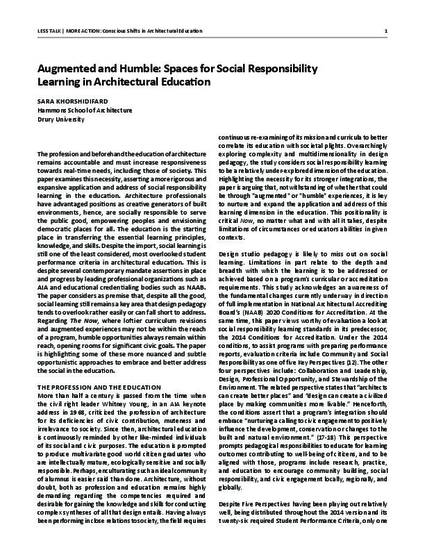
Article
Augmented and Humble: Spaces for Social Responsibility Learning in Architectural Education
2019 ACSA Fall Conference: LESS TALK | MORE ACTION September 13-15, 2019
(2019)
Abstract
The profession, hence and beforehand, the education of architecture is accountable for responsiveness towards real-time needs, including those of society. This paper examines this necessity, asserting a more rigorous and expansive application by better addressing Social Responsibility Learning in the education. Architecture professionals have advantaged positions as creative generators of built environments, hence, are socially responsible to serve the public good, empowering peoples and envisioning democratic places for all. The education is the starting place in transferring the essential learning principles, knowledge, and skills. Despite the import, social learning is still one of the least considered, most overlooked student performance criteria in architectural education. This is despite many contemporary mandate assertions in place/progress, for instance, by leading policies of professional organizations like AIA or educational credentialing bodies like NAAB. Social learning is a key area that design studio pedagogy may also overlook more easily or fall short to house. Limitations in part can relate to the depth and breadth with which the learning is to be addressed or achieved based on requirements throughout a school cycle. Under conditions for program accreditation, to help programs prepare performance reports, the National Architectural Accrediting Board embraces “Community and Social Responsibility” as one of five Key Perspectives. The weight prompts pedagogical responsibility to educate for outcomes contributing to the well- 21 2019 ACSA Fall Conference Abstract Book being of citizens. Programs must engage in research, practice, and education that encourage community building, social responsibility, and civic engagement at locally, regionally, and/or globally. Although this perspective is played out and distributed throughout NAAB’s twenty-six required Student Performance Criteria, only one is explicitly framed in title: A.8. Cultural Diversity and Social Equity. Despite a relatively light necessity, some more-privileged programs possess resources with elaborate curriculums for formally including the social. Many are either joined with in-house community planning and design centers or already offer complementary certifications such as Public Interest Design. Other programs, conversely, can stay behind, with little to no curricular prospects for the learning’s critical engagement. Regarding The Now, where loftier curriculum revisions are not within reach in a program, what are some tangible opportunities opening rooms for civic goals? What are some further nuanced, subtle, or opportunistic approaches to address the social? How can the education teach with ways of staying loyal to its integrity and better conventions while humanizing its apprentices, enabled to work with others across difference, acquire civic identity, actively participate in society to address civic issues, and ultimately orient social change? Can these be learned or is it too much to ask? In light of these questions, the paper will engage both challenges and ways to help fit civic learning within bounds of existing, standard pedagogies of standards programs. As feasible remedies to amend and enhance the embedment of learning processes and outcomes, the paper investigates the tactical, often, smaller-in-scope, course-based modifications, which can occur, if nothing else, but, always, no matter what.
Disciplines
Publication Date
Fall November 12, 2019
DOI
https://www.acsa-arch.org/chapter/augmented-and-humble-spaces-for-social-responsibility-learning-in-architectural-education/
Publisher Statement
Abstract Book:
https://www.acsa-arch.org/wp-content/uploads/2019/10/2019-Fall-Conference-Abstract-Book.pdf
Citation Information
Sara Khorshidifard. "Augmented and Humble: Spaces for Social Responsibility Learning in Architectural Education" 2019 ACSA Fall Conference: LESS TALK | MORE ACTION September 13-15, 2019 (2019) Available at: http://works.bepress.com/sara_khorshidifard/22/
Creative Commons license

This work is licensed under a Creative Commons CC_BY-NC-ND International License.
